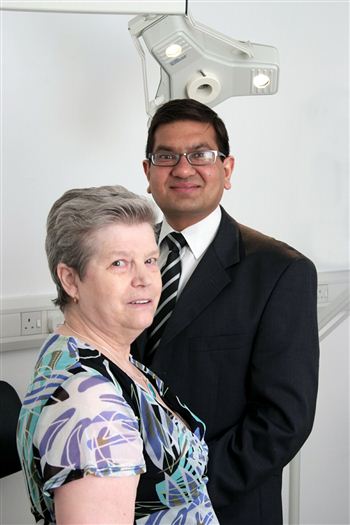By SHAUN MILNE
A GREAT-GRAN can see her family for the first time in 30 years – thanks to pioneering new eye surgery.
Jean Black, 69, is one of the first patients to have her eye sight restored after surgeons performed a groundbreaking new procedure called a corneal transplant.
Surgeons at the Princess Alexandra Eye Pavilion in Edinburgh were able to remove a diseased section of the pensioner’s eye and replace it with healthy donor cells.
Within days, Jean, from Prestonpans, East Lothian, was able to see clearly for the first time in her life and properly meet her grandchildren and great-grandchildren.

She said: “I couldn’t believe it when I realised I could see everything so clearly.
“It has changed my life completely.”
Genetic
“I was over the moon when I saw my great-grandchildren properly for the first time. I never knew they were so big.
“It means the world to me.”?
In March this year, Jean became one of a handful of patients in Scotland to undergo the procedure, called an endothelial transplant. She had suffered from Fuchs Dystrophy, a genetic condition which generally causes cloudy and blurred vision in later life.
Her case was slightly different and even as a child she was prescribed glasses which grew stronger each year.
Normally the condition would take hold in mid-life, but by the time she was in her 30s, she had lost most of her vision and could only see shapes and colours.
Her corneas, the curved windows at the front of the eyes, were so clouded there was no other option, but to perform a graft.
She underwent an earlier version of corneal transplant almost three years ago in the hope it would restore her vision to her left eye.
Unfortunately, although the earlier procedure also attained good results for many patients, it was not a success and her sight never returned.
Surgery
She said: “When I was told that I could have this new form of surgery in my other eye and I jumped at the opportunity.
“A couple of days after I had the operation, I could see properly with that eye for the first time in years.
“The difference between the two procedures is like night and day.”?
Dr Ashish Agrawal, Consultant Ophthalmic Surgeon, and his team at the Princess Alexandra Eye Pavilion became the first in Scotland to carry out the ground-breaking procedure in April last year.
The new operation removes only the diseased part of the cornea, the innermost layer, and replaces it with fresh tissue from a deceased donor. It is so precise that stitches are often not required.
The surgery replaces the more invasive transplant procedure, called Penetrating Keratoplasty, where the full thickness of the cornea was replaced, rather than just the diseased section.
It means that patients can see the results faster within days compared with one to two years for the old operation.
The procedure is also less invasive meaning that instead of having 16-20 stitches in place for a year, they usually have just one or two.
Dr Agrawal, who has a special interest in Corneal, Cataract & Refractive Surgery, said the operation had the power to transform lives and hopes he will be able to treat a wider audience.
Hospital
He said: “The endothelial transplant takes a lot less time to heal and no stitches are need to keep the fresh tissue in place.
“Patients are also out of hospital sooner.
“It not only increases patient comfort, convenience and satisfaction, but also allows huge financial savings.
“Patients are required to attend hospital less and there is not as much need for follow-up visits, additional procedures or complex spectacle prescription or contact lens fittings. ?
NHS Lothian was the first to perform the groundbreaking procedure in Scotland.

